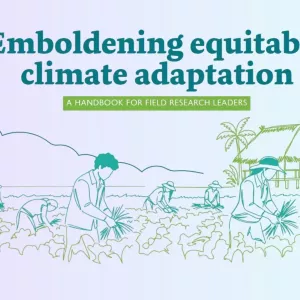Emboldening Equitable Climate Adaptation: A Handbook for Field Research Leaders
Climate change makes life incredibly difficult for smallholder farmers, but the programs meant to help them adapt, known as Locally Led Adaptation (LLA), often face a major hurdle: fairness. Too often, project benefits are ‘captured’ by powerful local figures or community elites, leaving the most vulnerable groups—like women, young men, and the poorest families—behind. This makes existing inequalities worse and

Emboldening Equitable Climate Adaptation: A Handbook for Field Research Leaders
Climate change makes life incredibly difficult for smallholder farmers, but the programs meant to help them adapt, known as Locally Led Adaptation (LLA), often face a major hurdle: fairness. Too often, project benefits are ‘captured’ by powerful local figures or community elites, leaving the most vulnerable groups—like women, young men, and the poorest families—behind. This makes existing inequalities worse and stops communities from truly building resilience. We have to change the starting point. Our new Handbook, developed by researchers including those from CGIAR and the International Rice Research Institute, offers a practical learning model to solve this by putting gender and social equity at the very heart of climate adaptation.
This is not just an abstract idea; the Handbook outlines a clear, five-step process for field leaders to create real, equitable change. These strategies guide teams on everything from how to effectively partner with diverse communities to setting up robust systems that hold projects accountable and prevent the powerful from dominating. The approach has been tested and proven in smallholder communities in places like Kenya and the Philippines, showing how high-quality, community-driven knowledge can lead to a more effective response to climate threats. By making this kind of participatory learning central to our work, we are empowering everyone to lead their own adaptation and sparking a long-term, sustainable social shift.
Download the handbook here:
Check the full story here: BLOG: Emboldening equitable climate adaptation: A handbook for field research leaders at IRRI’s Rice Today


